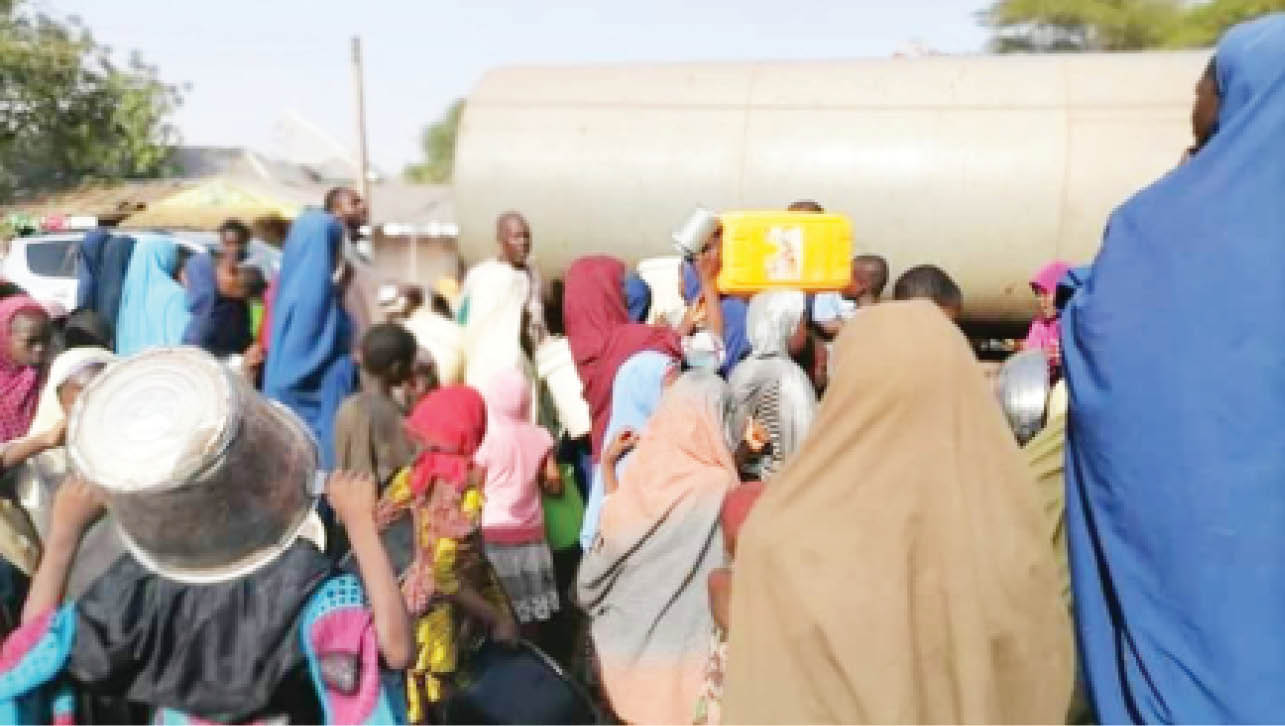Sokoto water scarcity: When developmental projects bring hardship to residents
The ongoing flyover and waterways projects being executed by the Sokoto State government have been a source of worry to many residents of Sokoto metropolis due to persistent water scarcity caused by the projects in the metropolis. Daily Trust on Sunday learnt that the problem was caused by the damaged pipelines as a result of […]

Some residents of Sokoto metropolis fetching water from a water tanker that was provided by Senator Aliyu Magatajarda Wamakko
The ongoing flyover and waterways projects being executed by the Sokoto State government have been a source of worry to many residents of Sokoto metropolis due to persistent water scarcity caused by the projects in the metropolis.
Daily Trust on Sunday learnt that the problem was caused by the damaged pipelines as a result of the construction work.
- Malaria still killing Nigerians in droves
- Nigeria-China N720bn currency swap deal on slow pace 3 years after
It was gathered that prices of jerry can of water skyrocketed in many of the affected areas as, according to our findings, a jerry can of water is being sold between N70 and N100 in some of the places.
A resident of Kofar Taramniya, Malam Abdulmumini, told our reporter that they were surviving on water from vendors and were not sure of its purity.
“We have boreholes which are not enough because of our population. A jerry can of water in the area is now between N70 and N100,” he said.
However, a resident of Tsamiya Dila who sought anonymity told our reporter that they have not been getting a regular supply of potable water since before Ramadan began.
The governorship candidate of the Social Democratic Party (SDP) in the last election in the state, Eng. Abdullahi Waziri, accused the state government of not doing enough to improve the supply.
Briefing newsmen on the water situation in the state, Waziri noted that residents of Sokoto and environs were faced by acute water scarcity due to government neglect of the system.

“Many families could not afford domestic water expenses, including myself. I had to buy pure water for my wife to cook our breakfast.
“There is therefore the need by the state government to address the issue before it is out of control.
“The problem is not unconnected with the Ministry of Water Resources and the Water Board regarding how they are managing the government scarce resources meant for the supply of water to the state capital.
The main source of raw water supply is from Rima intake along Kware road where about six pumping machines were installed with two working at any moment for 24hrs. But today only two pumps are in fairly good working condition.
“The second source is the Bi-water raw water intake which is also operating at less than 58% from underground boreholes. There are over 100 boreholes drilled for the purpose of supplying water to Sokoto town but less than 30% are operational.
“With the increase in population in the capital, there is supposed to be a commensurate increase in the supply of drinking water to the public but the contrary is the case as the government is not able to maintain the existing facilities not to talk of expanding the system.
“In fact, we are in a condition that could result in a catastrophic situation,” he said.
Responding, the Commissioner of Water Resources, Umar Bature, attributed the problem to the ongoing road and waterways construction which damaged many of their pipelines.
“But our men are working round the clock to repair them to restore the supply.
“In fact, I gave the officials of the state water board up to Friday to restore water supply to the affected communities or be sanctioned because I don’t see any reason why our people should continue to suffer,” he said.
Bature further denied that due process was not followed in the disposal of unused pipes of the state water board, saying an advertisement was placed on two national dailies and the sum of N20 million was realised from the disposal.
The commissioner cautioned people against spreading misleading information and politicising government policies, noting that the state government had achieved a lot in the provision of potable water in the state.
According to him, the sum of N123 million was being spent every month to supply water to residents of the state.
